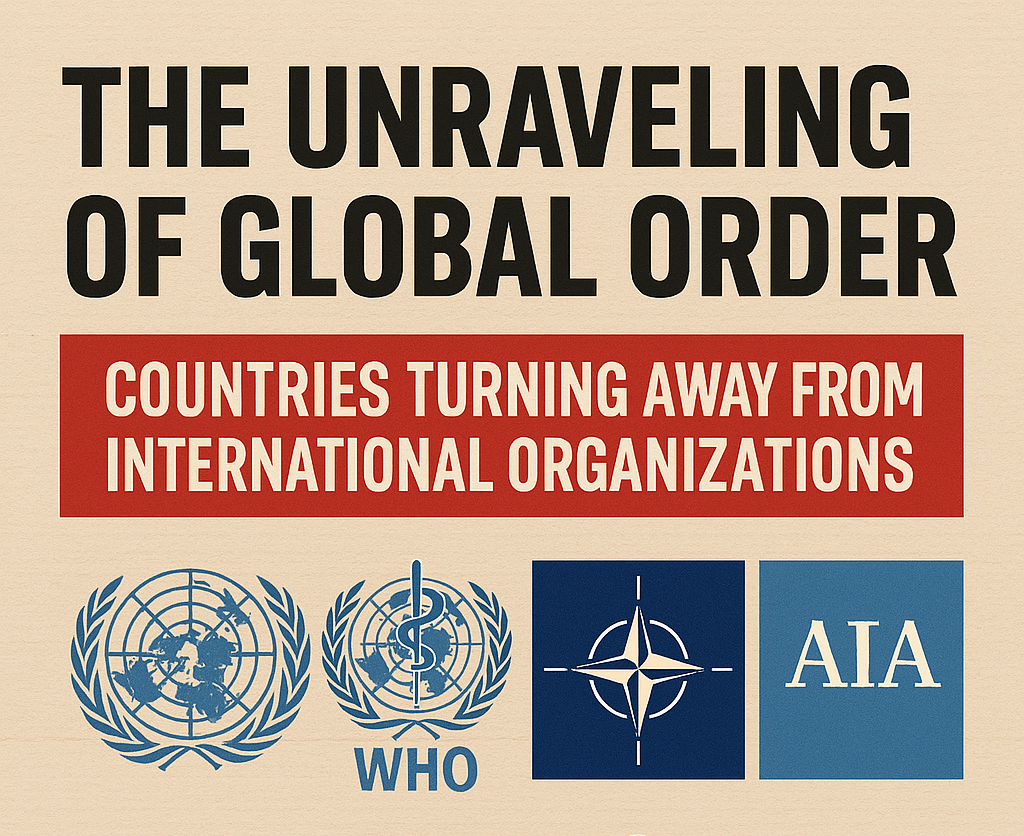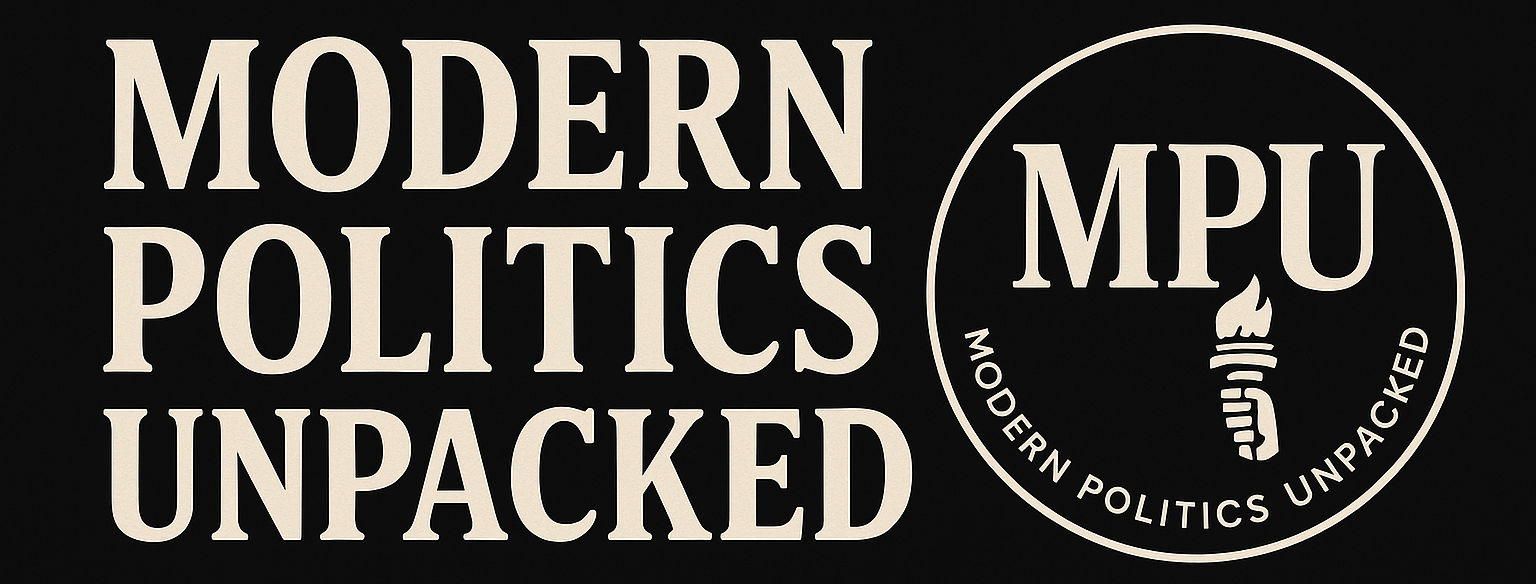The Unraveling of Global Order: Why Countries Are Turning Away from the UN, WHO, NATO, and the International Criminal Court — And What It Means for Our Daily Lives

In the decades following World War II, international organizations like the United Nations (UN), the World Health Organization (WHO), the North Atlantic Treaty Organization (NATO), and the International Criminal Court (ICC) emerged as pillars of global cooperation. They were designed to promote peace, health, human rights, and justice in a fragmented world.
But today, these very institutions are facing historic levels of skepticism, rejection, and withdrawal. Some of the world’s most powerful nations are not just questioning their effectiveness—they're actively undermining or leaving them. Meanwhile, emerging alliances like BRICS and the Shanghai Cooperation Organization are gaining prominence, promising a new, more multipolar world order.
This dramatic shift is not just diplomatic theater. The weakening of global institutions is impacting how pandemics are managed, how wars are prosecuted, and whether ordinary people have access to basic services, justice, and peace. In this article, we’ll explore:
- What these institutions do and why they were created
- Which countries are stepping away or defying them
- The political, ideological, and economic forces driving this change
- The direct consequences for people around the globe
- The rise of alternative systems like BRICS, AIIB, and SCO
- What the future of international cooperation might look like
1. Understanding the Global Institutions
United Nations (UN)
Founded: 1945
Purpose: Prevent war, uphold human rights, support development, and coordinate humanitarian aid
Members: 193 nations
Key branches:
- UN Security Council (responsible for peacekeeping decisions)
- UNHCR (refugee aid)
- WFP (food assistance)
- UNICEF (children’s rights and welfare)
World Health Organization (WHO)
Founded: 1948
Purpose: Lead international health responses, coordinate disease prevention, set standards for healthcare
Headquarters: Geneva, Switzerland
Members: 194 countries
North Atlantic Treaty Organization (NATO)
Founded: 1949
Purpose: Collective defense against aggression (initially against the USSR)
Members: 32 (with Finland and Sweden recently added)
International Criminal Court (ICC)
Founded: 2002 (Rome Statute)
Purpose: Prosecute individuals for genocide, war crimes, and crimes against humanity
Jurisdiction: 124 member states (notably excludes the U.S., China, Russia, and others)
2. Who’s Leaving, Withdrawing, or Pushing Back
United States
- Left UNESCO in 2018 over claims of anti-Israel bias; rejoined in 2023.
- Left the UN Human Rights Council in 2018 (under Trump); rejoined in 2021.
- Announced withdrawal from WHO in 2020; reversed in 2021.
- Never ratified the Rome Statute, and sanctioned ICC officials in 2020.
- Trump threatened multiple times to pull out of NATO, calling it “obsolete.”
Russia
- Withdrew from the Council of Europe in 2022.
- Rejected ICC jurisdiction and issued arrest warrants against ICC judges after Putin’s 2023 indictment.
- Undermines UN authority by vetoing Security Council resolutions related to Ukraine and Syria.
China
- Remains in most organizations but actively limits cooperation, especially with the ICC and UN human rights mechanisms.
- Opposes Taiwan’s participation in WHO.
- Uses its influence in WHO and UN to shape narratives around issues like Xinjiang and COVID-19.
African Nations
- Burundi left the ICC in 2017.
- South Africa has repeatedly tried to withdraw, citing ICC bias against African leaders.
- Kenya, Uganda, and Gambia have criticized the ICC for “selective justice.”
Middle East
- Israel refuses to accept ICC jurisdiction.
- Palestinian Authority uses the ICC to pursue legal action over alleged war crimes.
- Syria and Iran frequently defy or ignore UN mandates.
Asia-Pacific
- Philippines withdrew from the ICC in 2019 after investigations into Duterte’s drug war.
- India and China are not parties to the Rome Statute.
- Indonesia, Malaysia, and others express increasing discomfort with Western-led global norms.
3. Why Trust in Global Institutions Is Eroding
A. Perceived Bias and Western Dominance
- The UN Security Council still reflects WWII power structures, with five permanent members holding vetoes.
- The ICC has opened 30 investigations—most of them involving African nations.
- WHO was accused of being too deferential to China during the early COVID-19 outbreak.
“These organizations serve the interests of the West, not the Global South.”
— Naledi Pandor, South African Foreign Minister
B. Nationalism and Populist Politics
Populist leaders campaign on sovereignty and often frame global institutions as threats to national independence.
- Trump: “We reject the ideology of globalism and embrace the doctrine of patriotism.”
- Duterte: “I don’t recognize the ICC—it’s a useless body.”
C. Bureaucratic Inefficiency and Scandals
- Allegations of sexual abuse by UN peacekeepers in Congo and Haiti
- WHO’s handling of Ebola outbreaks criticized as too slow and opaque
- NATO’s intervention in Libya in 2011 led to chaos, undermining trust in “humanitarian” military actions
D. Strategic Rivalries
- U.S.–China tensions over trade, Taiwan, and tech spill into international forums.
- Russia’s aggression and isolation have forced alternative alliances.
- Countries now hedge their bets—participating in global bodies while building regional alternatives.
4. The Rise of Competing Institutions
BRICS+ (Brazil, Russia, India, China, South Africa + new members like Iran, Egypt, UAE)
- Proposed alternatives to the IMF and World Bank
- Created the New Development Bank
- Exploring a new currency to rival the U.S. dollar
Shanghai Cooperation Organization (SCO)
- A regional security alliance led by China and Russia
- Members include India, Pakistan, Kazakhstan, and Iran
- Framed as a counterweight to NATO
AIIB (Asian Infrastructure Investment Bank)
- Founded by China as an alternative to the World Bank
- Over 100 members, including U.S. allies like Germany and the UK
These groups often reject liberal democratic norms in favor of state sovereignty, non-intervention, and “mutual respect.”
5. Public Opinion: Do People Still Trust Global Institutions?
- Africa: Mixed views—strong support for UN development work, skepticism about ICC.
- Europe: High support for NATO in Eastern Europe; more divided in Western Europe.
- Latin America: Strong support for WHO and UN aid programs, but growing concern about Western economic domination.
- Asia-Pacific: Distrust of ICC and human rights bodies in more authoritarian-leaning governments; favorable views of WHO and UN on disaster relief.
Polls show trust in WHO surged during COVID-19 but dropped after 2021 in the U.S., Brazil, and India. Meanwhile, support for NATO grew significantly in Finland and Sweden post-Ukraine invasion.
6. The Real-World Impact on Everyday Life
A. Health: Less Coordinated Pandemic Response
- Countries withdrawing funding from WHO (like the U.S. under Trump) reduced the organization's pandemic preparedness.
- Poor global cooperation led to vaccine hoarding by rich nations and delayed delivery to the Global South.
- Local populations saw higher death tolls, longer lockdowns, and weaker access to public health information.
B. Food Insecurity and Humanitarian Aid
- The UN World Food Programme is struggling with budget cuts. In 2023, it had to reduce rations in Syria, Yemen, and the Sahel.
- Disengagement from UN agencies means millions face hunger, especially in conflict zones.
C. Security: The NATO Effect
- In Eastern Europe, faith in NATO offers psychological and strategic reassurance against Russian aggression.
- Countries like Ukraine and Georgia, outside NATO, face existential threats.
- In the absence of reliable alliances, smaller nations become more vulnerable to great-power coercion.
D. Justice for Victims
- The ICC has limited enforcement, especially when powerful states like the U.S. or Russia refuse to cooperate.
- Victims in Myanmar, Syria, and Ethiopia struggle to find accountability as national systems fail and international justice is blocked.
- This erodes faith in international law, potentially emboldening future war criminals.
E. Economic Uncertainty
- When global cooperation weakens, supply chains suffer, inflation rises, and investment stalls.
- Without international dispute mechanisms, trade wars (like U.S.–China tariffs) become more common and more damaging.
- Everyday consequences: higher food prices, job losses, weaker infrastructure support in developing countries.
7. Future Scenarios for Global Governance
Scenario 1: Reform and Renewal
Global institutions adapt to new realities:
- UN Security Council expansion
- More equitable leadership in WHO and ICC
- Stronger public transparency This would rebuild legitimacy and balance East-West tensions.
Scenario 2: Multipolar Fragmentation
- Institutions remain intact, but lose influence
- Competing alliances (BRICS, SCO, etc.) fill the void
- Governance becomes regionalized—less global oversight, more informal deals Risk: Weak enforcement of human rights, environmental goals, and conflict resolution.
Scenario 3: Breakdown and Conflict
- Global bodies collapse in credibility
- States rely only on power and ad hoc alliances
- Rise of proxy wars, vaccine nationalism, and climate failure This leads to greater instability, inequality, and insecurity for ordinary people.
Conclusion: The Global Order Is Fracturing—But Cooperation Is Still Possible
As more countries pull away from the institutions built to safeguard peace, justice, and health, the global order is entering a dangerous phase. But the unraveling isn’t inevitable. It is a warning sign—one that demands reform, not retreat.
For ordinary people, the stakes couldn’t be higher. Whether it’s access to food aid, protection from violence, or the ability to hold leaders accountable, international cooperation still matters. The challenge ahead is finding a way to rebuild trust and make global institutions work for everyone—not just the powerful few.
Sources & Further Reading
- United Nations: https://www.un.org
- World Health Organization: https://www.who.int
- NATO: https://www.nato.int
- ICC: https://www.icc-cpi.int
- BRICS Info: https://infobrics.org
- Human Rights Watch: https://www.hrw.org
- Council on Foreign Relations: https://www.cfr.org
- World Bank Data: https://data.worldbank.org
- Reuters, BBC, Al Jazeera (2020–2024 coverage)
